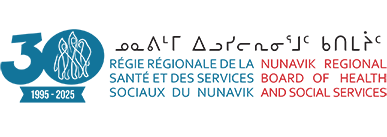The Department of Planning and Programming (PP) is responsible for organizing, coordinating, developing, and evaluating health and social services across Nunavik. Guided by the Ilusiliriniqmi Pigutjiutini Qimmiruniq (IPQ) model, our work helps ensure programs meet the real needs of individuals, families, and communities throughout the region.
The department is divided into four key areas:
- Medical Affairs and Physical Health
- Psychosocial Affairs
- Child, Youth and Family Services
- Civil Security
